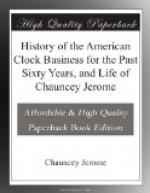Samuel Terry, a brother of Eli, came to Bristol about this time, and commenced making this kind of clock.
Several others began to make them—Geo. Mitchell and his brother in-law Rollin Atkins went into it, also Riley Whiting of Winsted. The business increased very rapidly between 1827 and 1837. During these ten years Jeromes and Barrow made more than any other company. The two towns of Plymouth and Bristol grew and improved very rapidly; many new houses were built, and every thing looked prosperous.
In 1831, a new church was built in Bristol, and, it is said, through the introduction of this Bronze Looking Glass Clock. Jeromes and Barrow paid one-third of the cost of its erection. The writer obtained every dollar of the subscription. The Hon. Tracy Peck and myself first started this project, which ended in building this fine church which was finished and dedicated in August, 1832. The Rev. David Lewis Parmelee preached the dedication sermon, and was the settled minister there. I was greatly interested in his preaching for ten years. He has for the last nineteen years preached at South Farms now the town of Morris. This Mr. Parmelee was a merchant till he was thirty years old, and was then converted in some mysterious manner, as St. Paul was, and left his business to preach the gospel. He proved to be one of the soundest preachers in the land, and I have no doubt but he will be one of the bright and shining lights in heaven. Oh! what happy days I saw during those ten years, little dreaming of the great troubles that were before me, or that I should experience in after life, which are now resting so heavily upon me, many times seeming greater than I can bear. But such is life.
About this time, also, Chauncey and Lawson C. Ives, two highly respectable men, built a factory in Bristol for the purpose of making an eight day brass clock. This clock was invented by Joseph Ives, a brother of Chauncey, and sold for about twenty dollars. The manufacture of these was carried on very successfully for a few years by them, but in 1836, their business was closed up, they having made about one hundred thousand dollars. Soon after this, in 1837, came the great panic and break down of business which extended all over the country. Clock makers and almost every one else stopped business. I should mention that another company made the eight day brass clock previous to 1837, Erastus and Harvey Case and John Birge. Their clocks were retailed mostly in the southern market. They made perhaps four thousand a year. The Ives Co., made about two thousand, but both went out of business in 1837, and it was thought that clock making was about done with in Conn.




